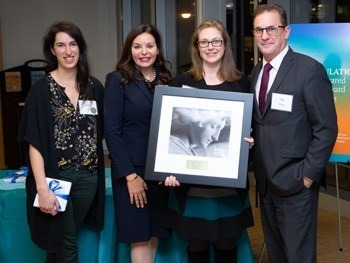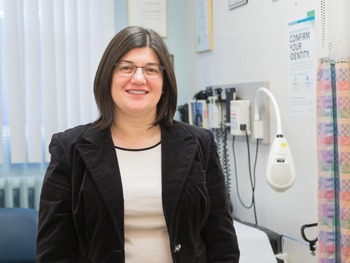PROVIDING CARE WITHOUT JUDGMENT FOR PREGNANT WOMEN WITH ADDICTIONS


April 15, 2019 – Pregnant women with addiction issues often face barriers like poverty, insecure housing and violence on top of the health risks of substance use. To make matters worse, they can be reluctant to seek out the medical care they need, says Dr. Suzanne Turner, medical director of St. Michael’s Substance Use in Pregnancy clinic.
“The majority of women with a history of substance use don’t present for prenatal care, because they’re concerned about child protection services,” says Dr. Turner, whose team won St. Michael’s 2018 Values in Action social responsibility award for their work. “That’s a huge barrier, but if we can get them into the clinic, we tell them their health is first and foremost, and we have social workers working with child protection to ensure the best outcomes for everyone.”
The Substance Use in Pregnancy clinic and the Toronto Centre for Substance Use in Pregnancy (T-CUP) clinic at St. Joseph’s Health Centre each provide comprehensive, compassionate pre- and post-natal care without judgment. They are family medicine-based clinics, with physicians and nurses trained in obstetrics and addiction care supported by social workers, addiction counselors and related community organizations to provide integrated care for patients and their babies.
“The mums love coming to a family medicine clinic,” says Dr. Alice Ordean, medical director of T-CUP. “There’s no sign saying pregnant addicts come here. So they can sit in the waiting room with other mothers and feel like a normal person. And our appointments are longer, so we can problem solve for various issues in one visit.”
At the St. Michael’s clinic, housed in the St. James Town Health Centre, they don’t even need an appointment. “If a patient is staying at a shelter, they don’t have to call or get a referral, they can just come by,” says Dr. Turner. “We’ve reached a lot of women who’d never make it to an obstetrician’s office for a 9 a.m. appointment just by being flexible.”
“They know they can come for care, whether they’re using or not,” says Dr. Ordean. “And the earlier we can get them in, the better. Women who come in during the first trimester have better outcomes in terms of reduced substance use than women who show up later. But even by just getting prenatal care without stopping their addiction, they will have improved outcomes.”

Getting the patients to come to the clinics is only the first challenge the teams face. Enabling them to take their babies home and care for them is another —if that’s what they want.
“We’re trying to help patients meet their goal,” says Dr. Turner. “It’s important that we don’t make an assumption that the woman sitting in front of us wants to parent. She may want to consider adoption or a kinship arrangement, where a baby goes to a family member. If that’s what she wants, that’s what we try to achieve. But definitely a huge goal is to ensure that those women who want to parent can parent. If they do, we try to get very clear guidance from child protection about what things need to happen, so we can facilitate them, and we make sure there’s a plan in place, so no one is surprised at the end.”
Dr. Turner points to the opiate crisis as another huge challenge, as the type of substances patients use have shifted over the years. “The severity of the addictions we’re seeing is significantly higher,” she says, “but the information we have about treating addictions in pregnancy is from the heroin era. It’s a different ball game to try and stabilize a pregnant woman who’s using fentanyl, because it’s 100 times more potent than heroin. But we’re trying to get the word out that this is not something they have to suffer with on their own, and that our treatments are good, they just need to work with us.”
And then there is the shortage of hospital beds for addictions care. “I’m constantly calling St. Michael’s to ask if we have a bed available to stabilize this woman, praying that we do,” says Dr. Turner. “And the medications we use can cause withdrawal in babies, so afterwards we’re looking at long stays in the nursery, which has impacts on the NICU as well as on the families.”
Still, the physicians know they’re creating long-term benefits as their clinics offer continued care after the birth. “I think we’re making a significant impact on both mother and baby—we improve the maternal health, and we obviously improve the child’s health,” says Dr. Ordean. “Some of my patients stay on with me for the long-term follow-up. I’ve been at St. Joseph’s for 18 years, and I have patients who’ve been with me for that whole period, so their kids are teenagers.”
“The benefit to being family physicians is that we’re in it for the long haul,” adds Dr. Turner. “Once you see me once, you’re stuck with me as long as you want me. So I have babies in my practice that I met when I first started, six years ago. We’re trying to provide the continuity of care that family medicine is really good at. It’s about building a relationship.”
